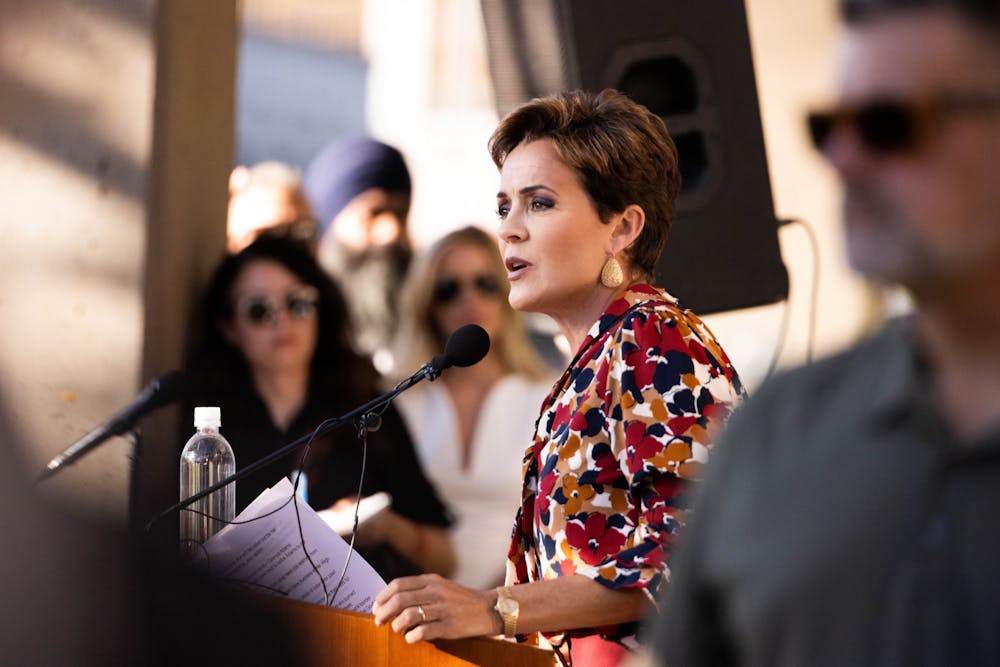Recent events in Arizona's governor's race shine light on how politics is becoming increasingly concerned with entertainment over education. From debate controversy to baseless criticisms of Arizona universities, the electoral drama and local political grandeur are at a peak, taking attention off essential local issues and drawing it to dramatics.
The gubernatorial race between Kari Lake and Katie Hobbs is an increasingly hot-button issue in local politics and, now, for Arizona PBS. Hobbs has been met with criticism from both Democrats and Republicans with her recent refusal to debate Lake, with some going as far as to call the move "political malpractice."
Democrats are especially concerned with Hobbs' refusal to debate Lake, as this can make her appear weaker, especially compared to her flashy opponent. Hobbs' campaign strategy is much more relaxed, which may lead her platform to be overlooked as her main media presence is based on controversy.
READ MORE: Inside Students for Kari Lake
Despite her refusal to debate Lake, Hobbs was granted a one-on-one interview with PBS, leading to the cancellation of Lake's interview with the station by the Arizona Citizens Clean Elections Commission. PBS's interview with Hobbs continued as scheduled on Oct. 18, while Lake interviewed with AZTV on Oct. 23.
READ MORE: Kari Lake's Arizona PBS interview canceled after station scheduled Katie Hobbs interview
Hobbs claims she will not debate Lake because her opponent is not interested in having a substantive discussion about Arizona issues, and is more concerned with "making a spectacle than anything else."
Of course, Lake has been using the controversy as ammunition against Hobbs, calling her cowardly for being too scared to debate. Lake herself has three decades of on-screen experience as a journalist and news anchor, which has proved to be useful experience for the campaign she is leading.
Hobbs isn't the only one receiving slander from Lake after the PBS controversy. Lake also slammed ASU for turning into a liberal campus due to "wokeism." She claims that "we have to root (it) out" in order to protect free speech.
Contrary to Lake's claims, a variety of members of the ASU community recently criticized ASU's free speech policy for being too lenient when ASU's Conservative Republicans United hosted known white supremacist Jared Taylor on campus this September. Many student groups advocated for the University to cancel the event and stand by its charter, which states ASU is "measured not by whom it excludes, but by whom it includes," for the safety of its students.
READ MORE: Opinion: Amid Jared Taylor event, ASU continues to platform bigotry
Lake's claims that ASU's "wokeism" and liberalism inhibit free speech seem to be baseless, at least in regard to the PBS controversy. Editor associate at Arizona PBS, Jamar Younger, detailed how Lake was offered an interview with Arizona PBS but declined the invitation.
"While KAET certainly appreciates the value of 'tradition,' KAET also has a responsibility to deliver news and information to the people of Arizona as well as responsibilities as a broadcaster with a license issued by the Federal Communications Commission," Younger said. "The invitations issued to both major party candidates for Arizona governor were issued in light of those responsibilities."
Instead of being concerned about both candidates sharing their platforms, Lake is more concerned with conspiracy theories about the "woke mob" and with creating a spectacle of herself in the media.
The dramatics of debate dissent and public slander display how ostentatious politics even at the local level has become. At this point, it seems the concern is no longer educating people on the particular platforms of candidates, but rather creating political splendor to keep people entertained.
Instead of focusing on name-calling and baseless accusations, Arizona voters need to look past the theatrics and focus on candidates' stances on local issues to decide which candidate will best serve the community.
Edited by Sadie Buggle, David Rodish, Piper Hansen and Grace Copperthite.
Reach the columnist at haleighbell1026@gmail.com and follow @wwoodengirl on Twitter.
Editor's note: The opinions presented in this column are the author's and do not imply any endorsement from The State Press or its editors.
Want to join the conversation? Send an email to opiniondesk.statepress@gmail.com. Keep letters under 500 words and be sure to include your university affiliation. Anonymity will not be granted.
Like The State Press on Facebook and follow @statepress on Twitter.




